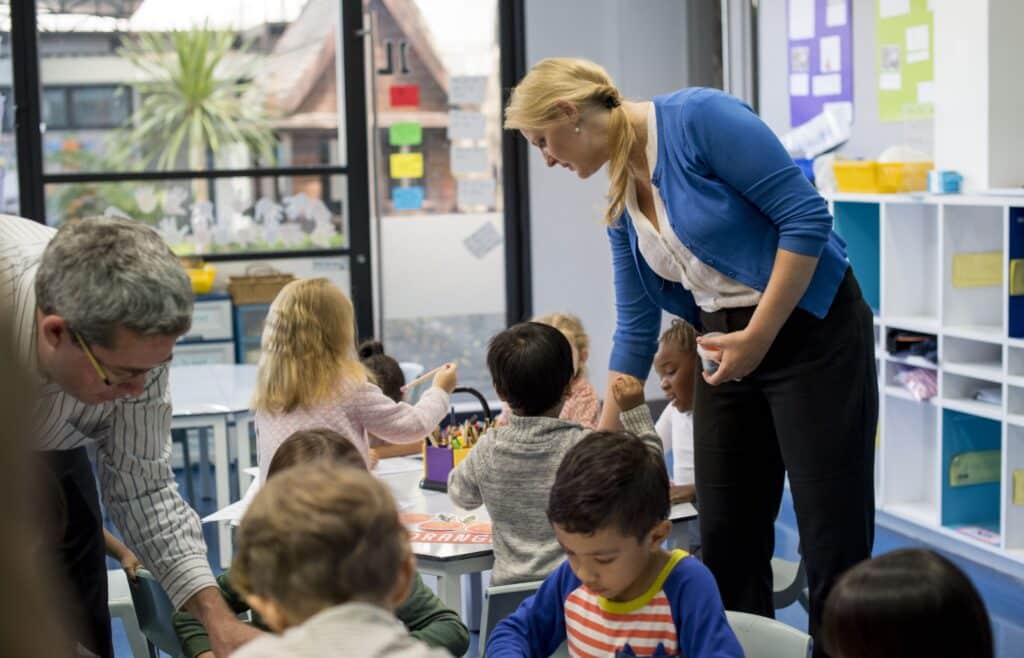Children between birth and five years old are developing a pre-learning foundation and socialization that will be built upon once entering a kindergarten program. Exposure to basic educational skills and social-emotional experiences will always set a child up for success before entering elementary school. Early childhood programs such as preschool and daycare environments can provide the necessary preparation a child will need in the first five years of growth.
When choosing the appropriate and best early childhood school fit for a child, parents may be faced with choices that include part-time, full-time, or extended-day options. Some early childhood learning programs offer curriculums that emphasize more “play” based models, or a stronger academic approach. Many daycares are now not only the best option for full-time working parents because of the hours but have developed curriculums to challenge and prepare children for elementary school.
Another benefit for a full-time early education program for any child versus a part-time option is the stamina a child can develop before kindergarten enrollment, as most kindergarten programs are full day. When considering the best program to satisfy educational and social needs, the five domains of early childhood development must be present. The five domains include social, emotional, physical, cognitive, and language.
Social
A preschool and daycare environment should be supporting the social skills of young children by modeling positive relationships, using appropriate language, and promoting activities to introduce and eventually master socially acceptable childhood skills, such as sharing, taking turns, waiting patiently, not interrupting, and entertaining themselves without disrupting others. The social situations children are faced with when in preschool will best prepare them for the elementary classroom where the class size is typically larger than a preschool classroom, where the teacher ratio is lower.
Emotional
The emotional development for children in their early years starts with recognizing and expressing personal feelings and responding to others with emotions that best fit a situation. When children attend a preschool environment for the first time regardless of the age of the child, there could possibly be an adjustment phase at drop off between the child and the parents. Some children experience separation anxiety and need extra time to feel comfortable without a parent. Most preschool instructors are prepared for excessive crying or mood changes with children that experience separation anxiety.
In situations where children feel anxious or worried, children need to learn self-regulation or soothing that involve learning tools to regain independence and comfort while at school. Preschool age children are also learning how to express emotions verbally instead of with physical actions, such as hitting, kicking, or having a tantrum. A substantial amount of time in preschool should be spent on social-emotional learning (SEL). SEL introduces children being tolerate around other children, making socially acceptable choices, and learning right from wrong. Children participating in social-emotional learning programs before kindergarten are usually the readiest to learn and build an academic foundation.
Physical
Physical development for children between birth and five years old includes the physical growth of the body, mind, and muscles. Many infants attending daycares will achieve developmental milestones, such as sitting up, feeding themselves, crawling, and possibly walking for the first time. Early physical development also involves understanding the five senses for the first time. Preschool programs offer opportunities for children to use their sense of touch to experience a variety of textures. Children are shown various pictures, sing songs, share new foods, and smell different aspects of their environment.
The development of gross motor skills and the beginning use of fine motor skills are two very important aspects of a young child’s physical development. The more opportunities young children have to play outside on developmentally appropriate playground equipment and participate in activities that develop strong core muscles the longer stamina they will have for building a foundation for learning.
Cognitive
Children, especially under the age of five have a desire to learn. The young child is inquisitive and can ask one question after another about any topic of their interest. Therefore, preschool teachers have great autonomy to expose little ones to many topics and skills that will build a foundation to make them lifelong learners. The topics can start out simple with recognition of colors, shapes, letters, and numbers. But can and should also involve science concepts, geography, and foreign languages. A young child’s mind is like a sponge.
Language
Children crave verbal stimuli. While in utero, a mother talks to her baby, and when a baby is born, the first voices they hear are of the parents. An important and memorable milestone for a child is when they say their first word. After using one word to identify familiar objects, get someone’s attention, or demand a need, the use of more than one word begins to develop, and the use of two or more words together to create a sentence happens. When sentences begin, then conversations occur, and negotiations for social and physical needs blossom.
The best opportunity for building language skills in early childhood is reading. The more a child hears words and is exposed to text, the better vocabulary a child can develop. A child’s expressive and receptive language skills begin developing in early childhood. Preschools and daycare centers that rely on digital learning tools do not provide the traditional language instruction needed to develop strong communication skills. The development of adequate language skills is paramount for engaging children to learn and retain the skills and concepts to allow them to be inquisitive learners.
Each of the five domains of early childhood development have significant importance and carry over to developing sustainable academic and social growth in elementary school for any student.
Have a passion for early childhood education? Explore our available early childhood education graduate programs and get started today!




